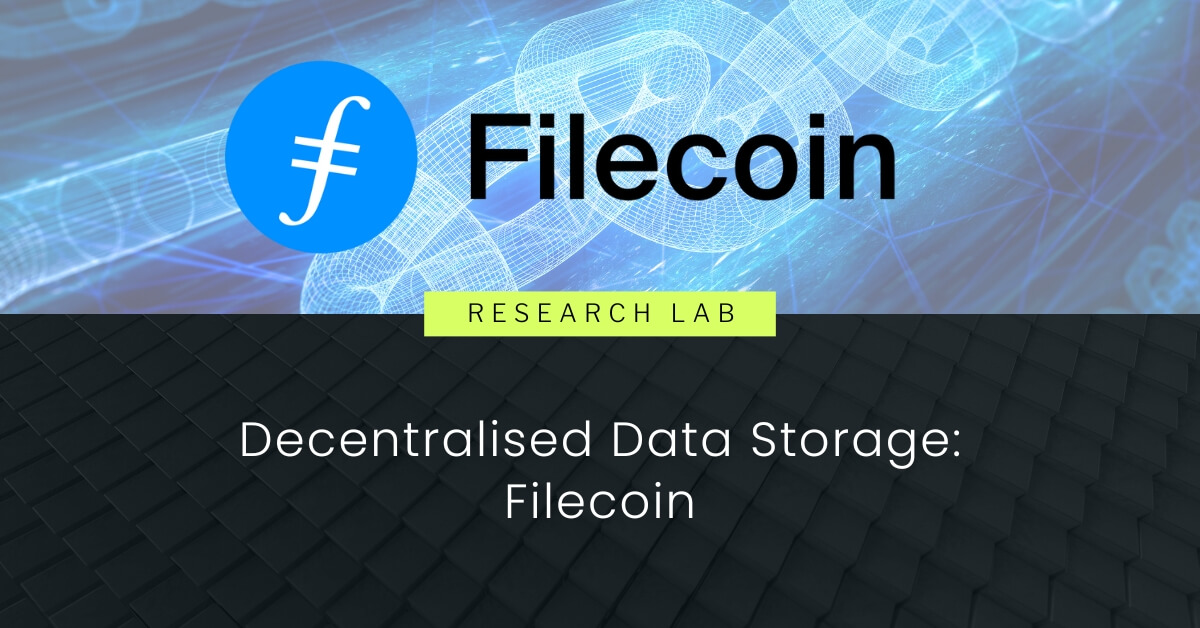Content
- What is Filecoin?
- How Does it Work?
- Filecoin Users
- Storage Miners
- Retrieval Miners
- Filecoin Blockchain Consensus
- Staking and Slashing
- Advantages of Filecoin
- Competitive Pricing
- Trustless
- Open Sourced
- Disadvantages of Filecoin
- “Rent” Not Own
- Privacy - or Lack Thereof
- Conclusion
- About Zerocap
- DISCLAIMER
- FAQs
- What is Filecoin and how does it work?
- What are the main participants in the Filecoin network?
- What is the consensus model used by Filecoin?
- What are the advantages and disadvantages of Filecoin?
- How does Filecoin compare to traditional file storage providers?
13 Apr, 23
Decentralised Data Storage: Filecoin

- What is Filecoin?
- How Does it Work?
- Filecoin Users
- Storage Miners
- Retrieval Miners
- Filecoin Blockchain Consensus
- Staking and Slashing
- Advantages of Filecoin
- Competitive Pricing
- Trustless
- Open Sourced
- Disadvantages of Filecoin
- “Rent” Not Own
- Privacy - or Lack Thereof
- Conclusion
- About Zerocap
- DISCLAIMER
- FAQs
- What is Filecoin and how does it work?
- What are the main participants in the Filecoin network?
- What is the consensus model used by Filecoin?
- What are the advantages and disadvantages of Filecoin?
- How does Filecoin compare to traditional file storage providers?
Decentralised file storage has achieved popularity alongside the emergence of blockchain technology like Bitcoin and Ethereum, highlighting humanity’s need for genuinely trustworthy and reliable computing systems. Today, decentralised data storage protocols could be seen as a competitor to traditional cloud storage providers like Google Cloud and Amazon Web Services (AWS). Immutability, tamper resistance and system uptime are popular topics when it comes to smart contract development, but from a web hosting and data storage perspective, it is often overlooked.
While blockchains technically allow users to store data in a decentralised manner, significant limitations apply. Proof of Work (PoW) and Proof of Stake (PoS) blockchains are only designed to hold small packages of data, usually in the form of smart contract code and calldata. Larger forms of data require different approaches towards decentralisation which are examined throughout the article.

What is Filecoin?
Built by Protocol Labs, Filecoin is an open-source, decentralised crypto-economic framework that incentivises storage providers to store data reliably over time while also providing a permissionless marketplace for file storage. Filecoin relies on IPFS (Inter-Planetary File Storage), designed and developed by Protocol Labs, as a distributed system for storing and accessing data. The network leverages unused storage space of electronic devices such as personal computers or server farms.
How Does it Work?
Users of the Filecoin network pay to store data on the network in Filecoin (FIL) with Filecoin miners earning FIL for providing services on the protocol. Commitments made within the network are recorded onto the blockchain that uses various consensus algorithms including Expected Consensus (EC), Proof-of-Storage (PoSt) and Proof-of-Replication (PoRep). Within those commitments, miners need to prove that they store the agreed data over time using PoSt; storage miners also have to prove that user data has been replicated across an array of nodes using PoRep. In the protocol, there are three main participants – Users, Storage Miners, and Retrieval Miners.

Filecoin Users
Users pay miners in FIL to store and retrieve data. Pricing for storage and retrieval is determined by a marketplace between storage miners and Filecoin users. Filecoin operates on a contract-based data availability model, meaning that users are renting storage space from providers. In this context, the Filecoin marketplace can be analogised to an Airbnb for storing one’s data.
Storage Miners
Storage Miners earn FIL by providing storage to the network’s users and further stake FIL as a form of collateral, ensuring that the miner acts honestly within the protocol. These miners store data in fixed-size sectors; 32Gib and 64Gib sectors are supported. A sector naturally expires when it reaches the end of its lifetime which is a maximum of 18 months. Storage miners are only able to recover their collateral and earn their reward once they have fulfilled their commitment to the Filecoin user and the lifetime of a sector has expired.
For a sector state to be outputted to the blockchain, a sector must be sealed. The act of sealing sector data is a computation-heavy process that produces a unique representation of the data in the form of a proof called a PoRep. The production of a PoRep proves which Storage Miner has sealed the data and provides a timestamp of when the data was sealed. Once the proof has been generated, the miner runs a Zero-Knowledge Succinct Non-Interactive Argument of Knowledge (zkSNARK) on the PoRep in order to compress it. In the process of compressing the data, proof is generated that establishes that all relevant information is valid. This proof is outputted to the blockchain. Subsequently, other miners have to replicate the PoRep in order to distribute the data across the network, ensuring there is not one central point of failure. The zkSNARK is used such that network participants can verify the authenticity of the stored data without the need to publish the data onto the blockchain. From this point onwards, miners have to prove that they continuously store the data that they pledged to store using PoSt; this proves that the storage miner is, in fact, storing a user’s data continuously over time.
Retrieval Miners
Retrieval Miners earn FIL by serving it to Filecoin users in an efficient manner. The retrieval market refers to the process of negotiating data storage deals for a storage miner to serve stored data for a Filecoin user. This process happens primarily off-chain, with few parts of it involving direct interaction with the Filecoin blockchain. The probability of a Retrieval Miner being selected depends on the miners’ internet bandwidth and latency in proportion to the Filecoin user’s location that is requesting the data from the chain.
Filecoin Blockchain Consensus
Filecoin uses a consensus model based on data storage, building upon both PoW and PoS models. Using EC, the blockchain is updated as new blocks are mined by a chosen Storage Miner; the probability of a miner being selected is proportional to how much storage is being verifiably provided to the network relative to others. This probability is determined by Storage Power Consensus (SPC). User data is stored outside of the blockchain, whereas the state of that data is stored on-chain. The state is recorded by generating proof that the data exists (PoST) and proofs that the data has been replicated across an array of miners (PoRep).
Staking and Slashing
Slashing is implemented in Filecoin to align miners’ incentives with the goals and mission of the network. Filecoin Storage Miners need to make a deposit in the protocol; this deposit acts as a form of collateral. The Storage Miner could lose this deposit if they are unable to confirm that they are storing the user data agreed upon.
Advantages of Filecoin
Filecoin comes with a myriad of advantages, particularly when comparing the protocol to centralised storage providers. The protocol showcases a prime example of the benefits that permissionless systems – particularly in terms of pricing and security:
Competitive Pricing
Filecoin’s marketplace functions as a permissionless open market. Pricing for data storage and retrieval is determined by supply and demand curves, instead of corporate pricing departments. Miners are incentivised to provide the most price-competitive offer for file storage creating a Darwinistic approach to storage provision. To date, Filecoin has been able to achieve significantly cheaper storage than traditional competitors.
Trustless
Filecoin users do not have to blindly trust that a storage provider is appropriately storing their data. Individuals can have a sense of security in the knowledge that their data is fortified through the implementation of cryptographic economic incentives. Miners are rewarded with FIL for storing and retrieving user data; storage miners are further penalised if they cannot demonstrate that they have kept the data they promised to store.
Open Sourced
The Filecoin protocol code is entirely open source and openly governed. This means all code within the protocol is open for anyone to inspect and alter within their own development environment. No one person or company owns Filecoin; it was created by a community of developers from around the world. Any person is also allowed to participate in Filecoin governance by submitting a Filecoin Improvement Proposal (FIP). Decision-making on FIPs is governed by a select committee of delegated community members.
Disadvantages of Filecoin
Although Filecoin presents various advantages, the technology does not come without its set of limitations. Within these limitations lie opportunities for further innovation within the file storage ecosystem.
“Rent” Not Own
Like traditional file storage providers, users of Filecoin are only able to “rent” data storage from storage miners, meaning they do not explicitly own the data being stored on the protocol. Storage miners are only incentivised to host data for as long as the Filecoin users are paying out FIL tokens to the miner. Due to the impermanence of storage, Filecoin is not the ideal solution for blockchain-based applications, but rather an alternative to storage providers like AWS or Google Cloud. Another decentralised protocol covered in the subsequent piece, Arweave, provides permanent data storage using endowment contracts.
Privacy – or Lack Thereof
It is a common misconception that data stored on the Filecoin network is private if the user does not share the hashes publicly. This is not the case. When a storage miner hosts user data, it announces that it has the content to the network. It does this so that the Filecoin network knows where to find the content that the storage miner has for replication and retrieval purposes. If a user wishes to store private data on the Filecoin network, then it is recommended that they encrypt the data before publishing it to the network.
Conclusion
Filecoin is an innovative crypto-economic framework built atop IPFS dedicated to providing trustless data storage infrastructure. The protocol uses FIL, its native token, to incentivise positive, logical behaviour as well as disincentivise malicious and lazy behaviour within the network. While permanency and privacy are not possible, the permissionless nature of the network provides a Darwinistic approach to data storage, naturally resulting in a product that is highly competitive to its centralised counterparts.
About Zerocap
Zerocap provides digital asset investment and digital asset custodial services to forward-thinking investors and institutions globally. For frictionless access to digital assets with industry-leading security, contact our team at [email protected] or visit our website www.zerocap.com
DISCLAIMER
Zerocap Pty Ltd carries out regulated and unregulated activities.
Spot crypto-asset services and products offered by Zerocap are not regulated by ASIC. Zerocap Pty Ltd is registered with AUSTRAC as a DCE (digital currency exchange) service provider (DCE100635539-001).
Regulated services and products include structured products (derivatives) and funds (managed investment schemes) are available to Wholesale Clients only as per Sections 761GA and 708(10) of the Corporations Act 2001 (Cth) (Sophisticated/Wholesale Client). To serve these products, Zerocap Pty Ltd is a Corporate Authorised Representative (CAR: 001289130) of AFSL 340799
All material in this website is intended for illustrative purposes and general information only. It does not constitute financial advice nor does it take into account your investment objectives, financial situation or particular needs. You should consider the information in light of your objectives, financial situation and needs before making any decision about whether to acquire or dispose of any digital asset. Investments in digital assets can be risky and you may lose your investment. Past performance is no indication of future performance.
FAQs
What is Filecoin and how does it work?
Filecoin is an open-source, decentralised crypto-economic framework that incentivises storage providers to store data reliably over time while also providing a permissionless marketplace for file storage. It relies on IPFS (Inter-Planetary File Storage) as a distributed system for storing and accessing data. The network leverages unused storage space of electronic devices such as personal computers or server farms. Users of the Filecoin network pay to store data on the network in Filecoin (FIL) with Filecoin miners earning FIL for providing services on the protocol.
What are the main participants in the Filecoin network?
The main participants in the Filecoin network are Users, Storage Miners, and Retrieval Miners. Users pay miners in FIL to store and retrieve data. Storage Miners earn FIL by providing storage to the network’s users and stake FIL as a form of collateral, ensuring that the miner acts honestly within the protocol. Retrieval Miners earn FIL by serving data to Filecoin users in an efficient manner.
What is the consensus model used by Filecoin?
Filecoin uses a consensus model based on data storage, building upon both Proof of Work (PoW) and Proof of Stake (PoS) models. Using Expected Consensus (EC), the blockchain is updated as new blocks are mined by a chosen Storage Miner; the probability of a miner being selected is proportional to how much storage is being verifiably provided to the network relative to others.
What are the advantages and disadvantages of Filecoin?
Advantages of Filecoin include competitive pricing due to its permissionless open market, trustless data storage infrastructure, and open-source code. However, it has limitations such as users only being able to “rent” data storage from storage miners, meaning they do not explicitly own the data being stored on the protocol. Also, privacy is not guaranteed as when a storage miner hosts user data, it announces that it has the content to the network.
How does Filecoin compare to traditional file storage providers?
Filecoin showcases a prime example of the benefits that permissionless systems offer, particularly in terms of pricing and security. The protocol’s marketplace functions as a permissionless open market, with pricing for data storage and retrieval determined by supply and demand curves, instead of corporate pricing departments. This results in a product that is highly competitive to its centralised counterparts like AWS or Google Cloud.
Like this article? Share
Latest Insights
Interview with Ausbiz: How Trump’s Potential Presidency Could Shape the Crypto Market
Read more in a recent interview with Jon de Wet, CIO of Zerocap, on Ausbiz TV. 23 July 2024: The crypto market has always been
Weekly Crypto Market Wrap, 22nd July 2024
Download the PDF Zerocap is a market-leading digital asset firm, providing trading, liquidity and custody to forward-thinking institutions and investors globally. To learn more, contact
What are Crypto OTC Desks and Why Should I Use One?
Cryptocurrencies have gained massive popularity over the past decade, attracting individual and institutional investors, leading to the emergence of various trading platforms and services, including
Receive Our Insights
Subscribe to receive our publications in newsletter format — the best way to stay informed about crypto asset market trends and topics.



 Share
Share  Tweet
Tweet  Post
Post 